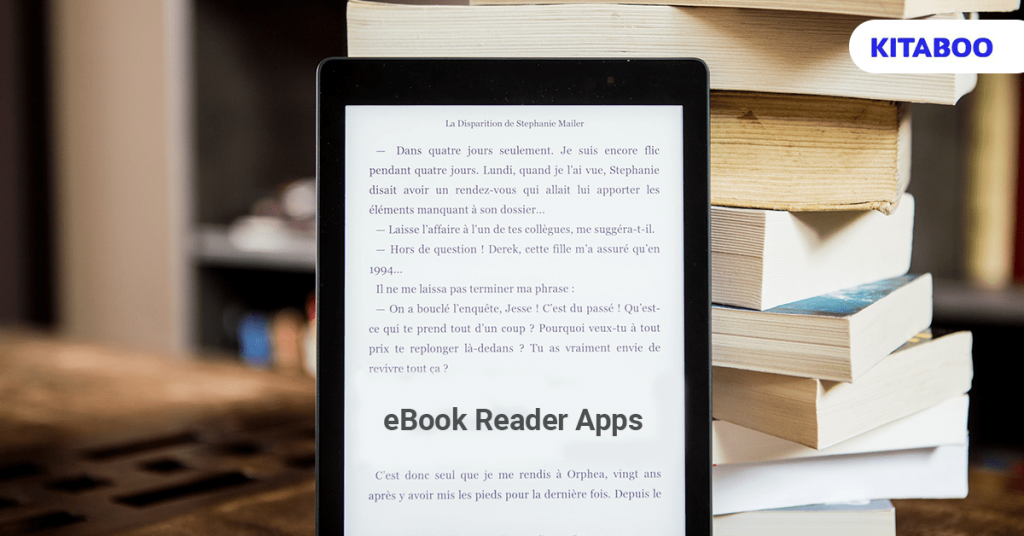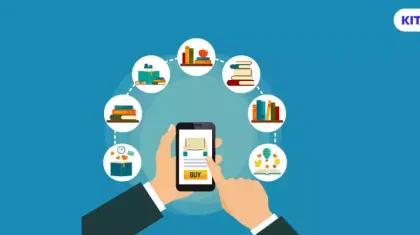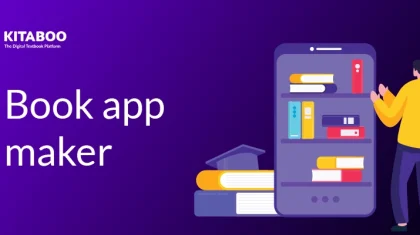
eBook Reader Apps – The Next Best Investment for K12 Organizations
Summarize this blog with your favorite AI:
eBook reader apps and platforms are becoming increasingly popular these days. In fact, the global eReader market was & is expected to grow by $5.23 billion between 2021 and 2026. What’s interesting is that one of the largest markets for eBooks and eBook readers is the K12 segment.
So what is it that has made this product so valuable for students and teachers alike?
Let’s find out.
Here’s what we’ll cover in this article.
- The Rise of the eBook Reader and Online Education Resources
- How eBooks Help K12 School Goers?
- How eBook Readers Help K12 Organizations
The Rise of the eBook Reader and Online Education Resources
The move towards eBooks and eReaders began in the early 2010s. Rising costs of printed materials, coupled with a growing sense of eco-consciousness amongst readers, made digital books and online readers more popular with the masses.
Almost a decade later, 2020 saw over 191 million eBook titles sold in the US alone. Other regions too, saw a rise in the consumption of eBooks and online education resources such as the UK (21%) and Asia (17.3%).
A recent survey by Pew Research shows that more people read books – both as a hobby and as part of their school/college courses – on their phones and tablets. As a result, mobile device-optimized eBook readers are one of the most downloaded apps on both Android and iOS devices.
The Coronavirus pandemic further propelled reliance on digital learning solutions. The education of over 1.2 billion children from 186 countries was affected. To help maintain continuity in education, K12 organizations invested in edtech, such as eBook platforms, eBook readers and online education resources.
It’s safe to say that eBooks and eBook platforms are here to stay even in 2023 and beyond.
How eBooks Help K12 School Goers?
They Allow Students to Study from Anywhere, at Any Time
Physical books are clunky, cumbersome, and difficult to carry. On the other hand, eBooks are digital files, and all one needs is an eBook app to access learning resources on their mobile device.
Students find it easier to take up lessons and read assignments using eBook apps, no matter where they are.
eBook Platforms Make Education More Affordable
Physical books need to account for the costs of paper, ink, printing, binding, and distribution. Additionally, as one progresses through the K12 system and begins studying more specialized content, the costs of physical books increase.
In comparison, the only major expenses with eBooks are the costs associated with the digitization of text. This makes them inexpensive. Most often students don’t have to bear this cost.
eBook Readers Make Academics More Engaging
eBooks can be created with images, memes, Gifs, and even interactive infographics and games.
Some eBook readers also support AR and VR content, which make K12 content more engaging for students of all ages.
eBook Apps Make Education Accessible to Students with Disabilities
eBook reading apps allow users to make display changes such as font size, alignment, line spacing, and background, making the content more legible. That apart, eReaders also support assistive technologies such as text-to-speech and optoelectronic reading systems, making educational content accessible.
eBook Apps Increase Efficiency
Many eBook readers come with built-in settings where students can bookmark pages, highlight important passages, make notes within the eBook and even share content with their peers.
Additionally, with interactive, multimedia features, eLearning platforms help combine theory with practice, exposing students to skills they’ll need in the future.
This can help us study better and become more efficient and productive learners.
How eBook Readers Help K12 Organizations?
Students are not the only ones to benefit from eBooks and eBook platforms. Let’s see how K12 organizations as a whole benefit as well.
eBook Readers Allow for Expansion of the Scope of Curriculum
Since physical books are expensive to procure, organizations may restrict the number of books studied as part of the curriculum. Also, physical books, once produced, cannot be modified easily. eBooks, on the other hand, can.
However, since online learning resources on eReading apps are inexpensive, organizations can recommend more diverse reading materials to students, helping them gain an expansive view of the subject.
eBook Apps Simplify the Process of Administering & Assessing Tests
By using digital books and eReading technology that support assessments and evaluations, K12 students can be tested effectively. Educators can not only provide multiple tests within each lesson, they can also opt for instantaneous evaluations.
This immediate feedback gives both students and educators insights into what exactly wasn’t understood and why. Students can also retake that part of the lesson with ease.
As a bonus, educators no longer need to carry test papers and notebooks around with eBook platforms.
eBook Apps Help Improve Insights
eBook reader technology improves teaching. Powerful eBook readers come with an analytics and reporting tool which allows educators to track and monitor a student’s engagement with each lesson.
This, coupled with metrics from test/exam performance, gives a clarity on where exactly students are experiencing trouble.
With these deep insights, educators can modify lesson plans to address the learning problem areas.
eBook Platforms Help K12 Organizations Reduce Their Carbon Footprint
As we know, children are the future. What better way is there to convey this message, than by setting an example. With K12 organizations adopting eBook apps, both the current environment and the world we leave for our children benefit.
Wrapping Up
Undoubtedly, eBook reader apps are the next best investment for K12 organizations. They have the potential to transform the world of education. However, in order to tap into this potential, there is a need to partner with a powerful technology such as the KITABOO eReader.
The KITABOO eReader has over two decades of experience as a robust eLearning platform for K12 organizations. It offers both content authoring and content sharing features.
From uploading multi-type content, to creating grade-specific and subject-specific playlists, or even sharing eBooks and other online education resources; KITABOO does it all securely with DRM protection.
Try it today and experience education at its finest.
To know more, write to us at contact@web-staging.kitaboo.com.
Also check:
Discover how a mobile-first training platform can help your organization.
KITABOO is a cloud-based platform to create, deliver & track mobile-first interactive training content.


